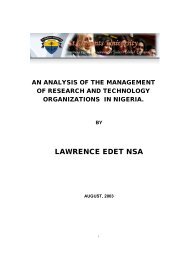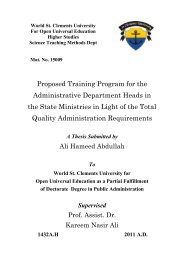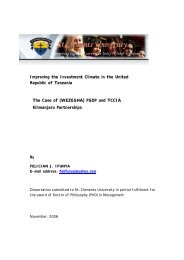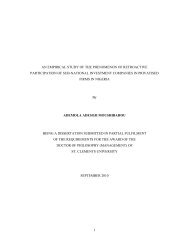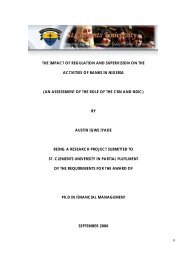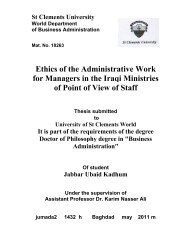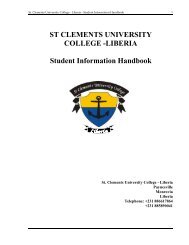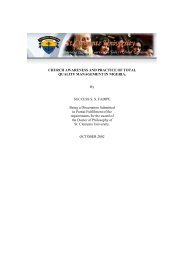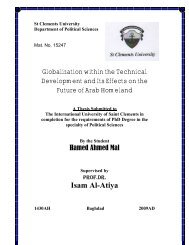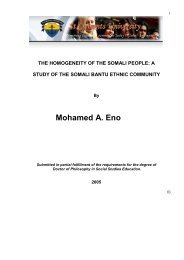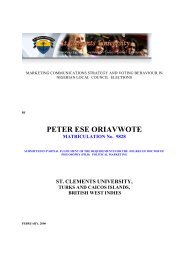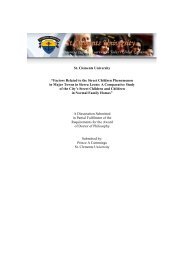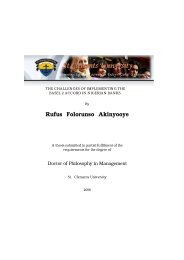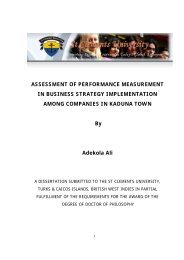The role of informal microfinance institutions in saving
The role of informal microfinance institutions in saving
The role of informal microfinance institutions in saving
Create successful ePaper yourself
Turn your PDF publications into a flip-book with our unique Google optimized e-Paper software.
2.2.0: EMPIRICAL LITERATURE<br />
2.2.1: Empirical literature from Tanzania<br />
Development International Desjard<strong>in</strong>s (2005) f<strong>in</strong>ds that Tanzania was the first country <strong>in</strong><br />
Africa to have a National Associations <strong>of</strong> credit Union. This is the sav<strong>in</strong>gs and credit union<br />
league <strong>of</strong> Tanganyika (SCULT) Ltd registered <strong>in</strong> 1964.<br />
Tito (2005) f<strong>in</strong>ds that sav<strong>in</strong>gs and credit cooperatives societies (SACCOs) sectors <strong>in</strong> Tanzania is<br />
still low and their formation be<strong>in</strong>g strong <strong>in</strong> Urban areas and cash crops grow<strong>in</strong>g areas. Areas<br />
produc<strong>in</strong>g food crops still experienc<strong>in</strong>g low formation <strong>of</strong> sav<strong>in</strong>gs and credit cooperatives<br />
societies (SACCOs)<br />
Chao-Ber<strong>of</strong>f et al (2000), noted that loans granted by sav<strong>in</strong>gs and credit cooperatives societies<br />
(SACCOs) <strong>in</strong> Tanzania were very few with further characterized by low level <strong>of</strong> diversified<br />
<strong>in</strong>vestments.<br />
<strong>The</strong> study carried out by Agrisystems (2003) f<strong>in</strong>ds that the rural f<strong>in</strong>ancial services program<br />
(RFSP) established <strong>in</strong> 1999 <strong>in</strong> Tanzania, has targeted rural poor house holders <strong>in</strong> Tanzania<br />
which are farm house holders non-farm house holds, community based organizations (CBO),<br />
Rotat<strong>in</strong>g Sav<strong>in</strong>gs and Credit Associations (ROSCAs) and Solidarity groups.<br />
Regard<strong>in</strong>g the impact <strong>of</strong> gender on enterprise development and capital availability, several<br />
thread emerge such as; Kasuga (1998) found that although women own a large proportion <strong>of</strong><br />
bus<strong>in</strong>esses, these were the least.<br />
Kashuliza and Kydd (1996) suggest that economically viable. <strong>The</strong> cultural climate <strong>in</strong> rural<br />
Tanzania placed women at a disadvantage <strong>in</strong> the provision <strong>of</strong> f<strong>in</strong>ancial services, one regard<strong>in</strong>g<br />
credit-accessibility. Can see an alternat<strong>in</strong>g asymmetry <strong>of</strong> dependence versus <strong>in</strong>dependence<br />
emerg<strong>in</strong>g. Thus, access to a commercial development might give one access ton certa<strong>in</strong><br />
f<strong>in</strong>ancial services, which <strong>in</strong> turn may provide for the <strong>in</strong>creased development <strong>of</strong> the enterprise<br />
etc,<br />
110



